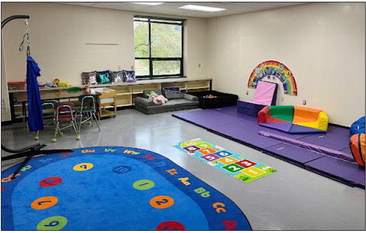Cornell School Board; Everyone one can use sensory relief now and then
Kari Koenig, Cornell assistant principal/at-risk/mental health coordinator (left), accepted a $1,000 grant through Give Chippewa County, to purchase stencils for an outdoor sensory path. The path will be constructed with help from older students, while a sensory room is already in place in the elementary, to help students self-regulate. Submitted Photo
By Ginna Young
Imagine, if you will, as an adult, you are faced with an entire day of wearing an itchy, irritating sweater. Now, imagine if there’s no relief from that?
That, in a sense, is what many of the Cornell Elementary students go through, on a daily basis.
“You might be able to work through that day, because you have those skills to move beyond that, but our children with sensory needs don’t have those means,” said Kari Koenig, assistant principal/at-risk/mental health coordinator. “They don’t know how to cope with those things.”
Koenig explained Sept. 25, at a Cornell School Board meeting, how the district is working to address that, by creating a sensory room at the elementary. Quite a large population of the elementary students have been identified as having autism of varying degrees on the spectrum scale, who will benefit from the sensory space.
“We really felt like there was a need,” said Koenig. Sensory issues can come from a child having difficulties receiving or responding to information from their senses. The kids can also have an understimulation, so the room is set up to help regulate the senses, with things such as a ball pit, musical instruments, weighted stuffed animals and more.
By using the sensory room – which was created from items purchased last school year, through the special ed budget – students can improve gross motor skills, cognitive development and tactile, auditory and visual processing.
“When it helps them to self-regulate, then when they get back to the classroom, it will improve their focus while they’re in there,” said special education teacher Jena Burton.
Speaking of sensory issues, it was important for the district to get the word out about the Homecoming football game Friday, Oct. 6, at 7, as a cannon is again expected to be set off when the Chiefs score a touchdown. Last year, it came to the school’s attention that not everyone in the community was aware that was happening and some were disturbed by the loud noise.
One family, in particular, has a child with sensory issues and the school made sure to inform them ahead of time about the cannon.
“Hopefully, the mom and dad can get earmuffs, or something,” said middle/high school principal Craig Braaten.
Although not expected for at least a year, new bleachers have already arrived to provide more room for spectators at the football games, which superintendent Paul Schley is very happy about.
“We can move them from place to place,” said Schley. Braaten also shared that the school’s blood drive that was scheduled for October, has been pushed to later, most likely in January, because of low staffing at the Red Cross.
Schley did mention that the district needs to figure out maintenance at the elementary, as water continues to leak inside the building.
The roof’s not the issue, it’s the walls,” said Schley. The walls were sealed and caulked, but the open-faced brick lets water seep into the classrooms and Schley’s office. It’s not hurting structurally, they don’t believe, but is still an issue.
Schley also reported that they are still working on a solar project at the school, through CESA 10, but have to get numbers before anything is decided. The board was in agreement that information should be shared with the public, prior to any action.
“It’s best to let our community know,” said board clerk Eileen Sikora.
Members also looked at the board policy on meetings and changing the time from 7 p.m. to 5 p.m., the fourth Monday of each month, unless the meeting falls on a holiday, such as July 4 or Memorial Day, in which case, it would take place the third Monday. The matter will be up for approval at the next meeting.
They also took a look at the next school calendar year, but agreed they wanted to inspect it closer and get the teachers’ opinion on it, before acting. A few of the board members cited the lack of days off for teachers, as the reason for concern over the proposed calendar.
“Is it really worth the stress and what you’re pushing yourself through?” asked Sikora.
Koenig said for her way of thinking, Memorial Day is a good cutoff, because once kids get those days off, it’s hard to interest them in school, as summer beckons.
“They’re done,” said Koenig. The board did approve the resignation of head track coach Laurie Bowe, who wants to watch her youngest son play basketball in college, but says she will help out at meets when she can.
I have enjoyed my time working with the athletes at the Cornell High School, as well as the track and field athletes from Lake Holcombe, wrote Bowe.
Members also approved the hire of paraprofessional Angie Winrich and head middle school girls basketball coach Kaitlyn Kozial.
Showing the good things that continue to happen within the district, board members were informed that there are 10 students in the College Transfer Academy, attending classes at CVTC in Chippewa Falls and Eau Claire.
For example, one such student, Grace Harycki, attends Mondays and Wednesdays, taking intro to American government; while Tuesdays are Chem 1 and English comp.; and Friday is chem lab.
“And I know our instructor’s actually going to get us into a UW-Eau Claire lab at one point, so that’s going to be pretty cool to do, too,” said Harycki.
Schley said the students are extremely dedicated and doing well, and that they amaze him at how willing they are to work.
It’s also impressive to see that there are 92 students enrolled in Cornell’s After-School program, more than half of the elementary population.
“A lot of kids are participating in after-school,” said Schley.





